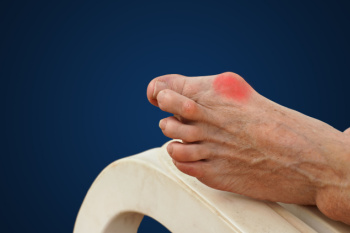Freehold (732) 294-9393
Freehold (732) 294-9393

Bunions develop due to prolonged stress on the metatarsophalangeal joint, often resulting from wearing ill-fitting shoes that force the big toe inward. This pressure causes the first metatarsal to angle outward and the big toe to point in the opposite direction, forming a noticeable bump. Additionally, genetic factors, low arches, flat feet, loose joints, and arthritis can contribute to bunion formation. Narrow, pointed-toe, or high-heeled footwear, commonly worn by women, can also heighten the risk. Furthermore, running in shoes with tapered toe boxes and elevated heels may exacerbate bunions over time. Bunions can lead to pain, discomfort, and even deformities such as hammertoes or corns. Prevention strategies include wearing wide-toed shoes, avoiding high heels, using toe spacers, and performing bunion massages to alleviate symptoms and prevent further complications. If you have a painful bunion, it is suggested that you schedule an appointment with a podiatrist for an evaluation and treatment that is best for you.
If you are suffering from bunions, contact Dr. Henry Miller of New Jersey. Our doctor can provide the care you need to keep you pain-free and on your feet.
What Is a Bunion?
A bunion is formed of swollen tissue or an enlargement of boney growth, usually located at the base joint of the toe that connects to the foot. The swelling occurs due to the bones in the big toe shifting inward, which impacts the other toes of the foot. This causes the area around the base of the big toe to become inflamed and painful.
Why Do Bunions Form?
Genetics – Susceptibility to bunions are often hereditary
Stress on the feet – Poorly fitted and uncomfortable footwear that places stress on feet, such as heels, can worsen existing bunions
How Are Bunions Diagnosed?
Doctors often perform two tests – blood tests and x-rays – when trying to diagnose bunions, especially in the early stages of development. Blood tests help determine if the foot pain is being caused by something else, such as arthritis, while x-rays provide a clear picture of your bone structure to your doctor.
How Are Bunions Treated?
If you have any questions, please feel free to contact our office located in Freehold, NJ . We offer the newest diagnostic and treatment technologies for all your foot care needs.